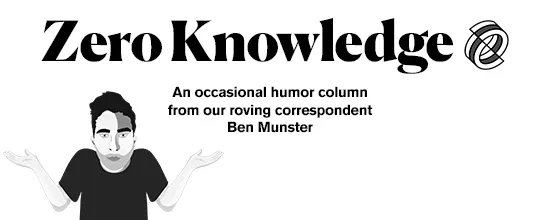We do the research, you get the alpha!

As with every great meme that has graced this benighted civilization, it began with an elegant and moving story, captured in all its fleeting delicacy by a Forbes “contributor.”
The story appeared under the headline, “Tiffany & Co Releases Those CryptoPunk Pendants And They Are Expensive, Here’s All The Intel.” There followed a rollicking article about the co-president of Tiffany and Co., Alexandre Arnault, boosting the market value of a series of CryptoPunk-themed pendants by way of a “guerrilla marketing campaign via his personal social media handle.”
More importantly, this line midway through the article was immediately seized on by Crypto Twitter: “He signed off the tweet ‘LFG,’ the NFT community speak acronym meaning ‘let’s form group.’”
Was it a mistake, or was it providence shaping mankind’s destiny via lax editorial standards on the Forbes contributor network? The contributor in question, Stephanie Hirschmiller, stands by her translation. She told me via Instagram DM that she googled the phrase and concluded that it's "NFT community speak" for "let's form group."
Crypto Twitter disagreed; “LFG" is more universally understood to mean “let’s fucking go.” (It is also the favored rallying cry of NFL star and crypto promoter Tom Brady.) Cue the spit takes.
let’s form a group ❤️ pic.twitter.com/hx8jli7tIS
— priyanka🍦 (@pridesai) August 2, 2022
let's form group! lmaooooo pic.twitter.com/0550Ethw7h
— Jay Kurahashi-Sofue 🔺 (@jayks) August 2, 2022
just ran this through the howey test, twice, can confirm accuracy.
— Dan Kahan (@dankahan) August 2, 2022
“let’s form group”
— Mike Shinoda (@mikeshinoda) August 2, 2022
Hirschmiller identifies herself in her contributor tagline as “a journalist and digital consultant based between Paris and London covering fashion, luxury and Web 3.0.” Elsewhere she describes herself as a “Footwear Authority [and] Web 3.0 Expert-in-Training.”
As something of a footwear authority myself (I make ends meet by selling men’s shoes in a local department store) I’m appalled by the shadow Hirschmiller has cast over our craft. But I get it. We all make mistakes. I once almost broke a fellow’s foot when I tried to shoehorn it into an E when the poor man clearly needed an EEE. Still.
The malaprop expanded infinitely as other Twitterers offered similarly benign translations.
“Let’s feign greatness,” suggested one. “Large friendly gathering,” added another. Clearly, Hirschmiller had tapped into some primal urge for group-forming yet to be articulated by Indo-European phraseology.
Call it the “Let’s Go Brandon” effect: an explanation of a term or phrase so skewed that it becomes more popular than the original. That’s also how HODL, for “hold,” came about—from a typo on a chat forum.
It was all in good fun, I guess, but I couldn’t help wondering whether this grave error didn’t speak volumes about Forbes, which is now scrambling to find a new buyer, and the long-smoldering dumpster fire of its infamous “contributor network.”
Some 2,800 “contributors,” most of them from marketing and PR rather than journalism, post on the site each day for a pittance. It’s a great Faustian bargain: Forbes gets fed troughs full of “content” every day (which begets clicks), and the “contributors” get ambiguously compensated.
According to former Forbes contributor Matt Zucker, five pieces of a few hundred words apiece in one month earn a writer $250; seven pieces gets $500. Zucker claimed each piece took him around ten hours—that’s over 140 hours for $1,000. “Yeah, we don’t do this for the money,” he admitted.
(Sounds familiar, and to be honest the pay is extremely competitive with the demeaning pittance I am paid here.)
What Forbes’s “contributors” do get out of this malarkey is clear: As Zucker wrote in a Medium blog post about his time in the Forbes contributor farm, the contributors effectively have carte blanche to publish whatever they want—often unedited. Given that many contributors have their own professional agenda, getting a contributor contract is the equivalent of getting access to free, endless PR on tap. T’would that I had access to such a resource, so I could advertise my nascent side hustle.
Hirschmiller, the accidental coiner of the new “LFG” meme, has made good use of the network. Her recent oeuvre on Web3 innovation includes: “How Paris Hilton And Snoop Dogg Animated Their Bored Apes, What The Technology Could Mean For Brands”; “The Disruptive Idea Behind Prada’s New Timecapsule NFT Collection With Damien Hirst’s Son”; and “Is A Metaverse HQ With Bored Ape NFTs, Helipad, Cinema The Next Must-Have For Luxury Brands?”
A dubious and inevitably anonymous “source” tells me that there is actually some oversight of the crypto contributor network, or at least more than there used to be, and that Forbes Crypto editor and former CoinDesk journalist Michael del Castillo runs a “tight ship.” But this piece was not part of the crypto contributor network; it was filed under Retail.
And the contributor network writ large remains a kind of “YouTube for writing,” so caveat emptor.
Which makes you think: Maybe Hirschmiller knew that this choice of translation would cement her place in Internet meme history. And like any calculating and underpaid Forbes “contributor,” she figured it was worth the money. In which case, I salute her and wish to join her. Let’s form group!
Editor's note: This column was updated on August 3 at 8:30am EST with comment from Stephanie Hirschmiller.





